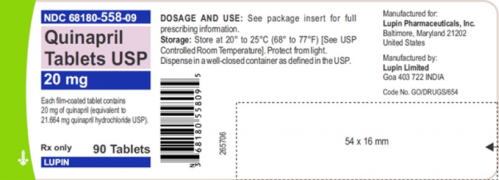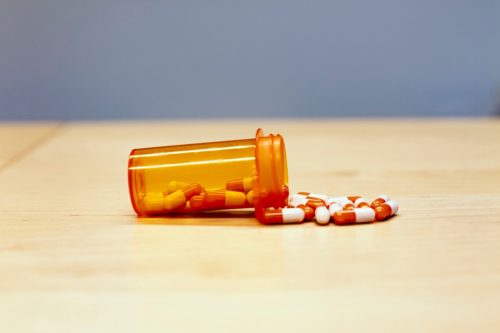Blood Pressure Medication Recalled Over Cancer Risk Concerns, FDA Says in New Warning

Almost half of U.S. adults have hypertension, more commonly referred to as high blood pressure, according to the Centers for Disease Control and Prevention (CDC). Most of these patients are advised to take medication, which can control blood pressure and prevent more serious complications like heart disease and stroke. If you’re one of the many Americans taking these meds daily, however, you’ll want to be aware of the latest recall, which affects one blood pressure medication that could do more harm than good, according to the U.S. Food and Drug Administration (FDA). Read on to find out what experts recommend you do if you have this prescription.
READ THIS NEXT: High Blood Pressure? Drinking 2 Cups of Coffee Daily Doubles Heart Disease Death Risk, New Study Finds.
An “impurity” was detected when Quinapril underwent testing.

On Dec. 21, the FDA announced that Lupin Pharmaceuticals is voluntarily recalling four lots of Quinapril tablets that were distributed to patients. The medication is an angiotensin-converting enzyme (ACE) inhibitor, which lowers blood pressure in patients with hypertension.
Per the FDA notice, recent testing found the “presence of a nitrosamine impurity,” called N-Nitroso-Quinapril, that was above the Acceptable Daily Intake (ADI) level. Affected lots include both 20-mg Quinapril Tablets USP and 40-mg Quinapril Tablets USP, which were distributed in 90-count bottles to “wholesalers, drug chains, mail order pharmacies, and supermarkets.”
The news comes after Aurobindo Pharma USA, Inc. voluntarily recalled two lots of Quinapril and Hydrochlorothiazide Tablets due to the same concern in October.
Nitrosamines are actually common, and not always cause for concern.

The FDA explains that nitrosamines aren’t always dangerous—everyone is exposed to some level of these compounds, as they are commonly found in “water and foods, including cured and grilled meats, dairy products, and vegetables.” But when people are exposed to higher levels of nitrosamines over extended periods of time, cancer risk can rise.
The FDA has an entire page that gives an overview of nitrosamine impurities in different medications. According to the site, the FDA actively investigates the presence of these impurities and recommends that manufacturers recall drugs that may be above the internationally-recognized ADI limits.
The agency explains that if your medication has nitrosamine levels within or below the ADI limits, and you take it every day for 70 years, you aren’t expected to have an increased risk of cancer. The risk is solely connected to those who take in higher levels over longer periods.
To date, Lupin hasn’t received any reports of illness related to the Quinapril tablets.
RELATED: For more up-to-date information, sign up for our daily newsletter.
You can check your medication to see if it’s part of the recall.

All four lots of recalled Quinapril tablets were distributed between March 15, 2021, and Sept. 1, 2022, as Lupin stopped marketing the drug in September of this year. The single lot of recalled 20-mg tablets has an expiration date of April 2023, a lot number of G102929, a National Drug Code (NDC) of 68180-558-09 (90’s), and a Universal Product Code of 368180558095.
The remaining three lots contain 40-mg tablets with an NDC of 68180-554-09 (90’s) and a UPC of 368180554097. The first two lots—G100533 and G100534—both have an expiration date of Dec. 2022, and the last lot—G203071—has an expiration date of March 2023.
UPCs are found under the scannable barcode, and NDCs are listed above the brand name on the packaging. Lot numbers are printed on the side of the bottle’s label.
Reach out to your doctor if you take Quinapril tablets.

According to the FDA, Lupin is currently calling all entities where drugs were distributed to inform them of the recall and arrange a return of affected products. In the meantime, those with the medication in stock are asked to immediately stop distributing from recalled lots.
Consumers who take 20-mg or 40-mg Quinapril tablets are advised to contact their pharmacist, physician, or healthcare provider to inquire about alternative treatment. In the meantime, continue taking your medication as prescribed, the FDA says.
If you have questions about the recall, you can contact Inmar Rx Solutions, Inc. at (877) 538-8445, Monday through Friday between 9 a.m. and 5 p.m. Eastern Standard Time (EST). If you do experience an adverse reaction or encounter a quality problem associated with Quinapril use, the FDA asks that you report it to the MedWatch Adverse Event Reporting program. You can do so online, or via regular mail or fax.
Best Life offers the most up-to-date information from top experts, new research, and health agencies, but our content is not meant to be a substitute for professional guidance. When it comes to the medication you’re taking or any other health questions you have, always consult your healthcare provider directly.